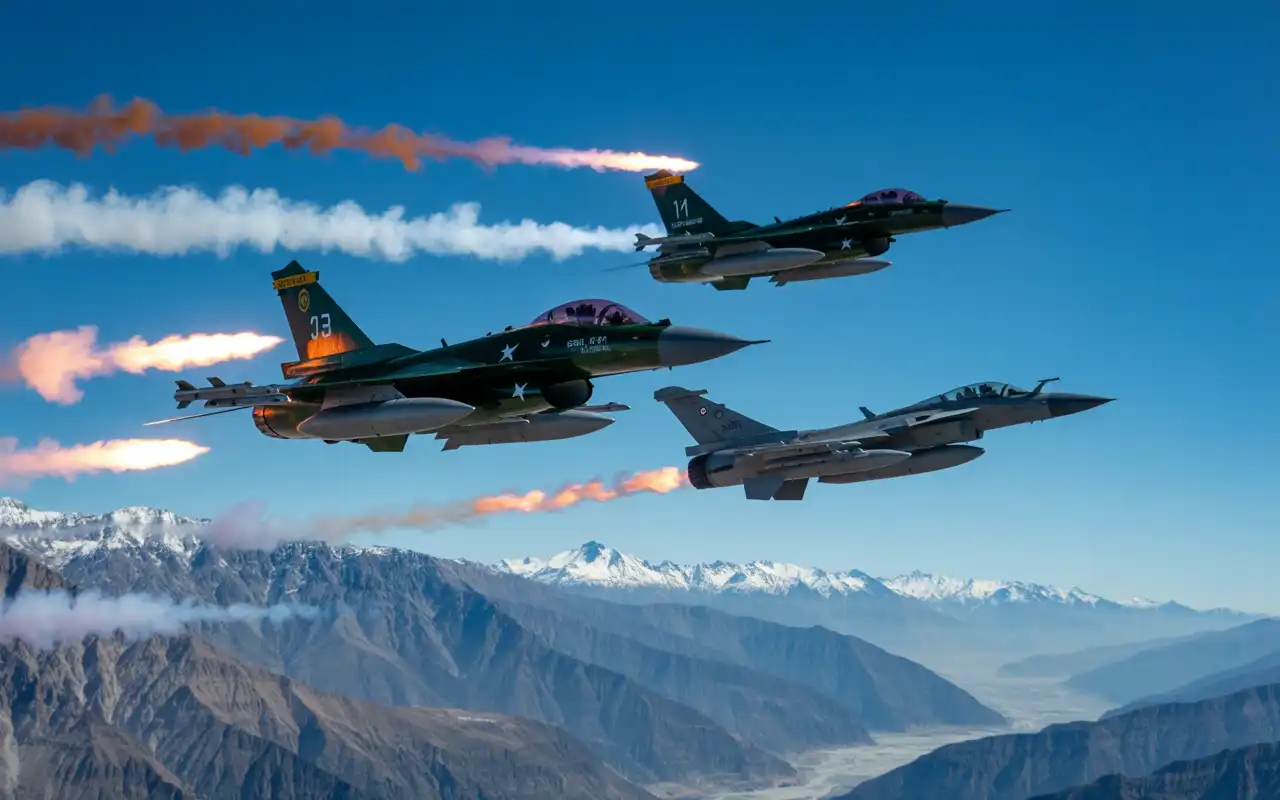In terms of modern aerial warfare, the most critically defining assets are information, technology, and precision timing. The Pakistan Air Force (PAF) has proven its strategic capability by employing the advanced “ABC” combat system.
An integrated aerial battle coordination system that was crucial in countering the Indian Air Force (IAF) even as India brought in the much-hyped Rafale fighter jets.
The Rise of Rafale Fighter Jets in South Asia
India’s acquisition of Rafale fighter jets from France was viewed as a potential military game changer in South Asia. With stealth capabilities in addition to Meteor air-to-air missiles and electronic warfare systems, the Rafales were supposed to secure air superiority for the Indian Air Force (IAF).
But the Pakistan Air Force (PAF) had equally been quietly and efficiently advancing its operational capabilities not just with the JF 17 Thunder Block III but also with an even more important secret weapon, the ABC combat system.
What Is The ABC Combat System?
System ABC stands for Aerial Battle Coordination and is a futuristic system that serves as a network-centric warfare platform for the PAF. It is an Integrated warfare solution that includes:
- Gathering intelligence in active time
- Communications and radar technology for both ground and satellite
- Operating with electronic warfare systems
- Decision-making supported by AI
- Information dissemination through secured, quickly connection channels in active/multi-asset frameworks
Having every fighter aircraft, drone, radar, and missile system interconnected is aimed at providing a synchronized and fast responsive combat system, often referred to as the combat cloud.
How PAF Outmaneuvered IAF
At the Line of Control area, the IAF deployed Rafale fighter jets. Still, they were unable to gain the tactical upper hand because of how PAF intelligently utilized the ABC system:
Tracking Everything
With the integration of the Chinese AWACS and the APC network, PAF not only had ground radar capabilities but also aerial 360-degree tracking coverage. This included monitoring of the Rafale takeoff and landing.
Communications and Radar Lock-Out
The Indian Rafale users lost the ability to communicate, share data, and lock missiles during the missile readiness check-up due to PAF jamming Indian communication systems. Because of this, the Rafales were unable to utilize their BVR advantage.
Architecture with AI-driven optimal configuration enables prompt air and drone deploys while simultaneously retaining older, slower IDF command systems and protocols.
Deception and Decoys
The PAF misemployed the use of drones with decoy signal jammers to fabricate radar cross sections. Some of the Rafale pilots apparently were tricked into thinking they were being missile locked, forcing them to perform evasive maneuvers.
Strategic Outcome
While there has been no large-scale dogfight after the induction of Rafales, the ABC system helped PAF to deny India airspace dominance and contain threats in a preset manner. In several encounters, including reconnaissance interceptions and cross-border standoffs, PAF’s superior coordination crippled the Rafale jets off giving them no period of dominance.
Integration of PL-15 missiles: A Strategic Leap
Apart from further complementing the ABC system, Pakistan’s recent collaboration with China has increased the country’s aerial prowess. Under a significant defense agreement, China has begun granting a license for the production of its advanced PL-15 long-range air-to-air missiles within Pakistan, including a complete technology transfer to the PAF.
The PL-15 missiles are famed for having a range greater than 200 kilometers, coupled with active radar guidance and sophisticated counter-countermeasures. Their integration into the PAF stockpile, especially with the JF-17 Block III and J-10C fighter jets, poses a serious threat to India’s Rafale jets outfitted with Meteor missiles.
This development not only advances Pakistan’s strategic autonomy in defense industry integration and manufacturing but also indicates a growing and deeper geostrategic partnership with China, which may shift the aerial paradigm in South Asia.
Final Thoughts
With the addition of China’s PL-15 missiles, the Pakistan Air Force’s ABC combat system has subtly transformed the story of air combat in the region. While Rafale’s jets capture the attention, PAF’s strategic innovation reveals that dominance is not achieved through a single platform, but rather through integrated systems, quick movements, and advanced, clever maneuvers.
FAQs
An additional 18 jets were received in 2021, which brings the total number of cumulatively received jets to 36. France delivered all 36 Rafale jets to India by 2025 as per the 2016 agreement of €7.8 billion.
The PAF’s use of networked warfare or systems integration and the employment of PL-15 missiles has closed that gap. Rafale is more advanced technologically in avionics and the range of missiles.
ABC’ is a networked, AI-based, enhanced battle coordination system that incorporates real-time integration of all combat and surveillance systems under one interface for efficient orchestration and is powered through artificial intelligence.
Though no direct combat has taken place, JF-17s and F-16s have locked in skirmishes with Rafales under the PAF’s command in retaliatory engagements to IAF cross-border operations.








